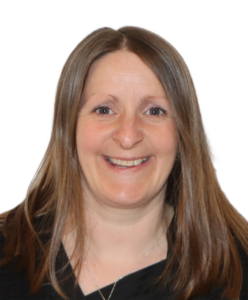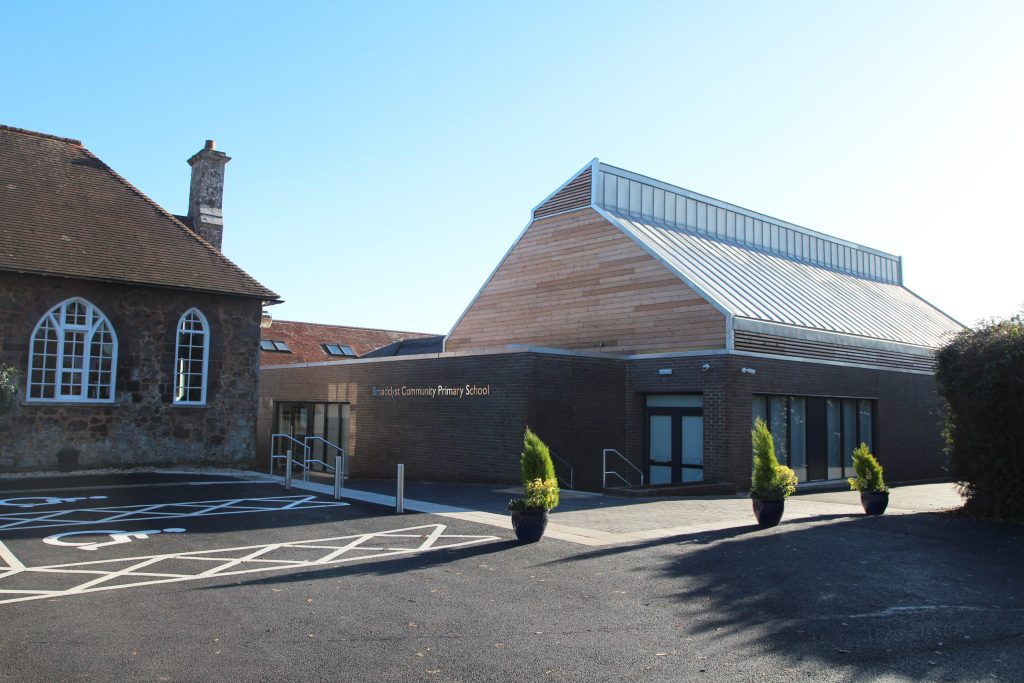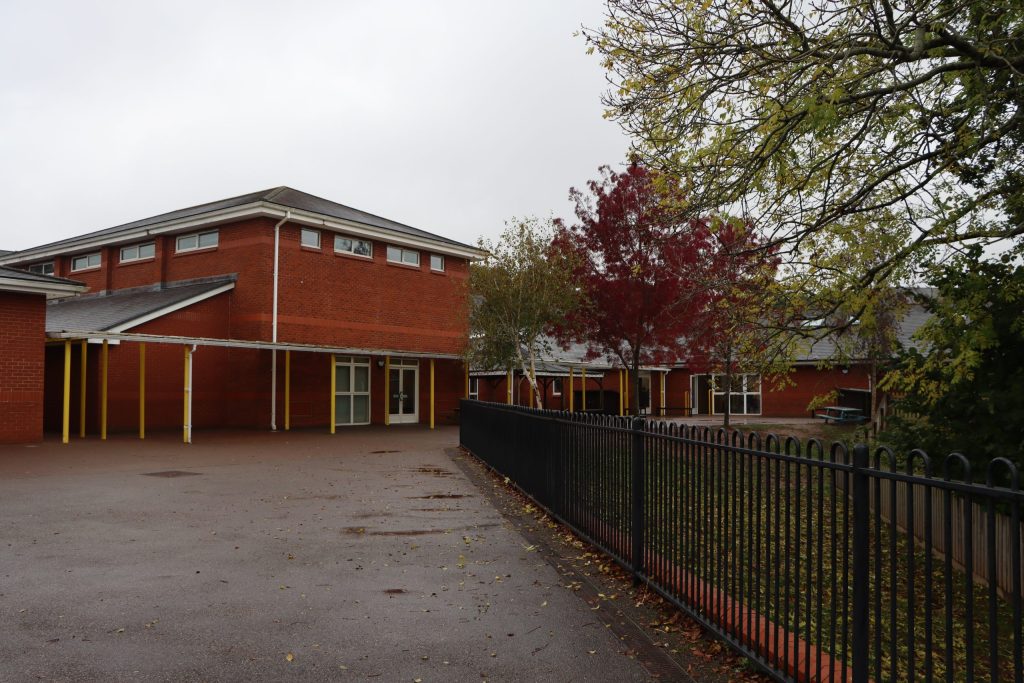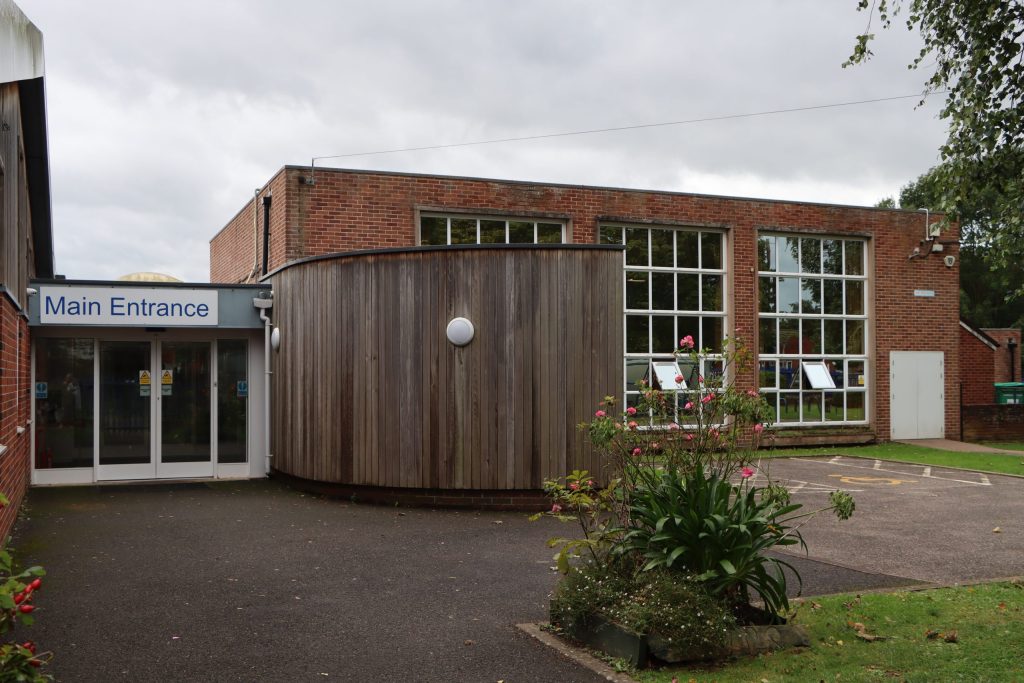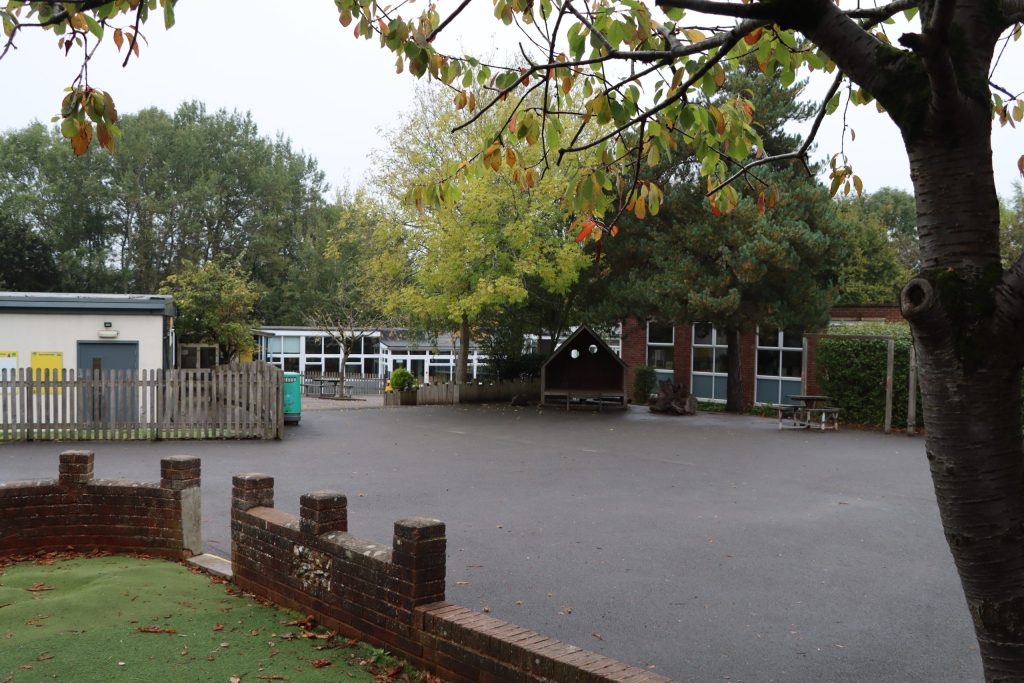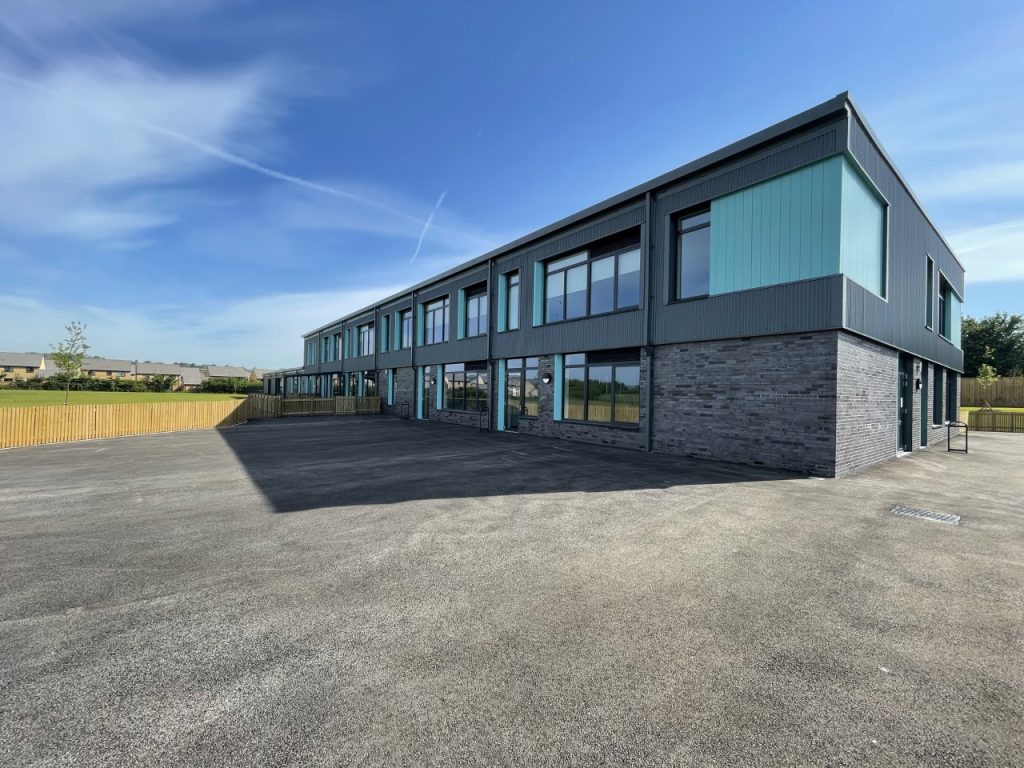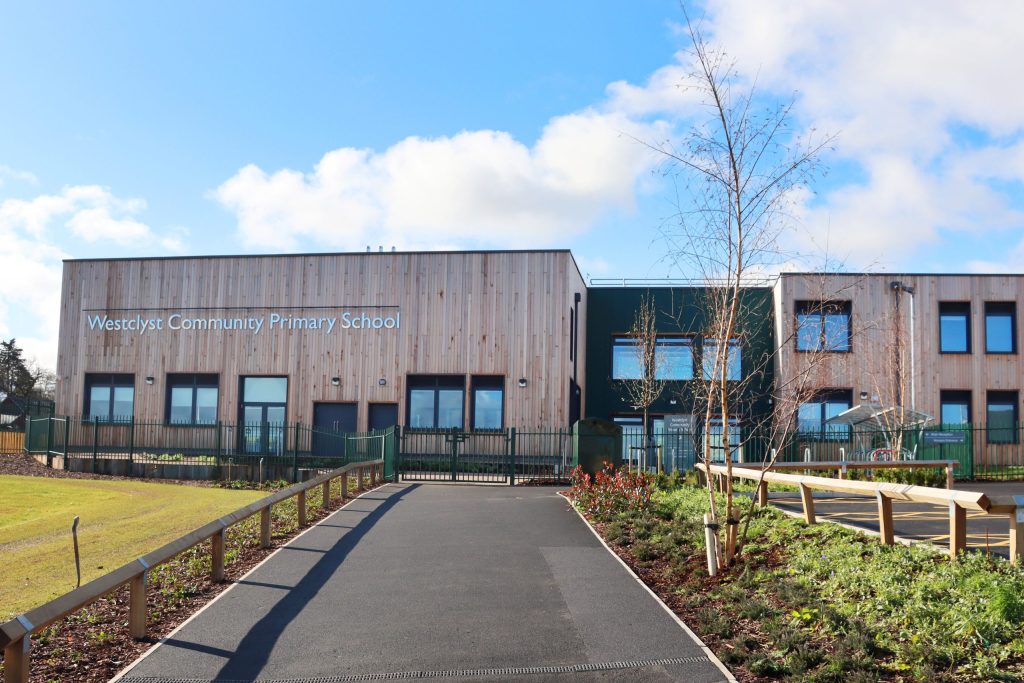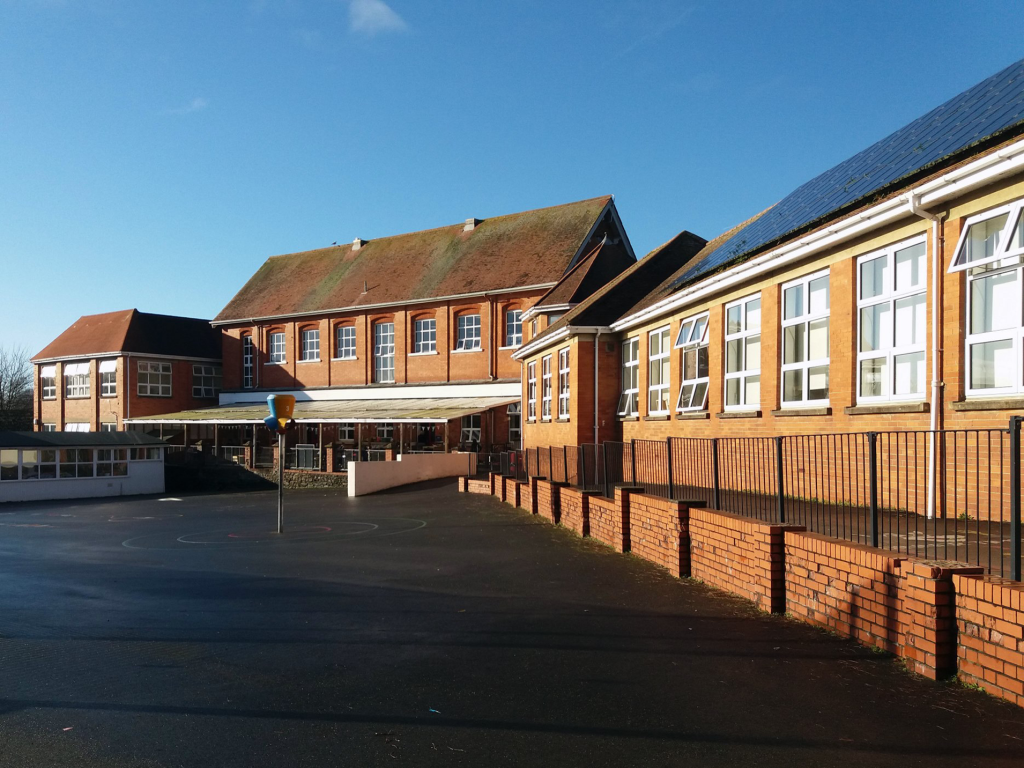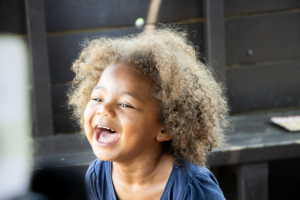
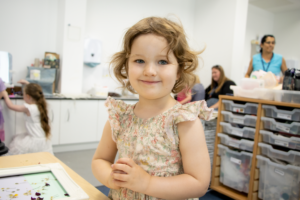
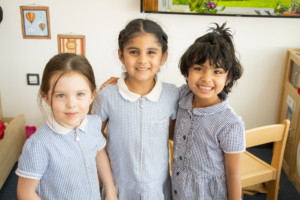
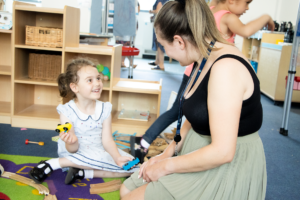
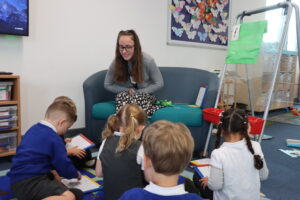
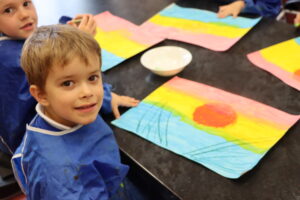
EYFS Statutory Framework Educational Programme
The development of children’s spoken language underpins all seven areas of learning and development. Children’s back-and-forth interactions from an early age form the foundations for language and cognitive development. The number and quality of the conversations they have with adults and peers throughout the day in a language-rich environment is crucial. By commenting on what children are interested in or doing, and
echoing back what they say with new vocabulary added, practitioners will build children’s language effectively. Reading frequently to children, and engaging them actively in stories, non-fiction, rhymes and poems, and then providing them with extensive opportunities to use and embed new words in a range of contexts, will give children the opportunity to thrive. Through conversation, storytelling and role play, where children
share their ideas with support and modelling from their teacher, and sensitive questioning that invites them to elaborate, children become comfortable using a rich range of vocabulary and language structures.
EYFS Development Matters Statements
Birth to Three:
- Turn towards familiar sounds. They are also startled by loud noises and accurately locate the source of a familiar person’s voice, such as their key person or a parent.
- Gaze at faces, copying facial expressions and movements like sticking out their tongue. Make eye contact for longer periods.
- Watch someone’s face as they talk.
- Copy what adults do, taking ‘turns’ in conversations (through babbling) and activities. Try to copy adult speech and lip movements.
- Enjoy singing, music and toys that make sounds.
- Recognise and are calmed by a familiar and friendly voice.
- Listen and respond to a simple instruction.
- Make sounds to get attention in different ways (for example, crying when hungry or unhappy, making gurgling sounds, laughing, cooing or babbling).
- Babble, using sounds like ‘baba’, ‘mamama’.
- Use gestures like waving and pointing to communicate.
- Reach or point to something they want while making sounds.
- Copy your gestures and words.
- Constantly babble and use single words during play.
- Use intonation, pitch and changing volume when ‘talking’.
- Understand single words in context – ‘cup’, ‘milk’, ‘daddy’.
- Understand frequently used words such as ‘all gone’, ‘no’ and ‘bye-bye’.
- Understand simple instructions like “give to nanny” or “stop”.
- Recognise and point to objects if asked about them.
- Generally focus on an activity of their own choice and find it difficult to be directed by an adult.
- Listen to other people’s talk with interest, but can easily be distracted by other things.
- Make themselves understood, and can become frustrated when they cannot.
- Start to say how they are feeling, using words as well as actions.
- Start to develop conversation, often jumping from topic to topic.
- Develop pretend play: ‘putting the baby to sleep’ or ‘driving the car to the shops’.
- Use the speech sounds p, b, m, w.
- Pronounce:
- l/r/w/y
- f/th
- s/sh/ch/dz/j
- multi-syllabic words such as ‘banana’ and ‘computer’
- Listen to simple stories and understand what is happening, with the help of the pictures.
- Identify familiar objects and properties for practitioners when they are described. For example: ‘Katie’s coat’, ‘blue car’, ‘shiny apple’.
- Understand and act on longer sentences like ‘make teddy jump’ or ‘find your coat’.
- Understand simple questions about ‘who’, ‘what’ and ‘where’ (but generally not ‘why’).
EYFS Development Matters Statements
Three to Four Year Olds:
- Enjoy listening to longer stories and can remember much of what happens.
- Pay attention to more than one thing at a time, which can be difficult.
- Use a wider range of vocabulary.
- Understand a question or instruction that has two parts, such as “Get your coat and wait at the door”.
- Understand ‘why’ questions, like: “Why do you think the caterpillar got so fat?”
- Sing a large repertoire of songs.
- Know many rhymes, be able to talk about familiar books, and be able to tell a long story.
- Develop their communication, but may continue to have problems with irregular tenses and plurals, such as ‘runned’ for ‘ran’, ‘swimmed’ for ‘swam’.
- Develop their pronunciation but may have problems saying:
- Some sounds: r, j, th, ch, and sh
- Multisyllabic words such as ‘pterodactyl’, ‘planetarium’ or ‘hippopotamus’
- Use longer sentences of four to six words.
- Be able to express a point of view and to debate when they disagree with an adult or a friend, using words as well as actions.
- Start a conversation with an adult or a friend and continue it for many turns.
- Use talk to organise themselves and their play: “Let’s go on a bus… you sit there… I’ll be the driver.”
EYFS Statutory Framework Educational Programme
Children’s personal, social and emotional development (PSED) is crucial for children to lead healthy and happy lives and is fundamental to their cognitive development. Underpinning their personal development are the important attachments that shape their social world. Strong, warm and supportive relationships with adults enable children to learn how to understand their own feelings and those of others. Children should be
supported to manage emotions, develop a positive sense of self, set themselves simple goals, have confidence in their own abilities, to persist and wait for what they want and direct attention as necessary. Through adult modelling and guidance, they will learn how to look after their bodies, including healthy eating, and manage personal needs independently. Through supported interaction with other children, they learn how to make good friendships, co-operate and resolve conflicts peaceably. These attributes will provide a secure platform from which children can achieve at school and in later life.
EYFS Development Matters Statements
Birth to Three:
- Find ways to calm themselves, through being calmed and comforted by their key person.
- Establish their sense of self.
- Express preferences and decisions. They also try new things and start establishing their autonomy.
- Engage with others through gestures, gaze and talk.
- Use that engagement to achieve a goal. For example, gesture towards their cup to say they want a drink.
- Find ways of managing transitions, for example from their parent to their key person.
- Thrive as they develop self-assurance.
- Look back as they crawl or walk away from their key person. Look for clues about how to respond to something interesting.
- Play with increasing confidence on their own and with other children, because they know their key person is nearby and available.
- Feel confident when taken out around the local neighbourhood, and enjoy exploring new places with their key person.
- Feel strong enough to express a range of emotions.
- Grow in independence, rejecting help (“me do it”). Sometimes this leads to feelings of frustration and tantrums.
- Begin to show ‘effortful control’. For example, waiting for a turn and resisting the strong impulse to grab what they want or push their way to the front.
- Be increasingly able to talk about and manage their emotions.
- Notice and ask questions about differences, such as skin colour, types of hair, gender, special needs and disabilities, and so on.
- Develop friendships with other children.
- Safely explore emotions beyond their normal range through play and stories.
- Talk about their feelings in more elaborated ways: “I’m sad because…” or “I love it when …”.
- Learn to use the toilet with help, and then independently.
EYFS Development Matters Statements
Three and Four Year Olds:
- Select and use activities and resources, with help when needed. This helps them to achieve a goal they have chosen, or one which is suggested to them.
- Develop their sense of responsibility and membership of a community.
- Become more outgoing with unfamiliar people, in the safe context of their setting.
- Show more confidence in new social situations.
- Play with one or more other children, extending and elaborating play ideas.
- Find solutions to conflicts and rivalries. For example, accepting that not everyone can be Spider-Man in the game, and suggesting other ideas.
- Increasingly follow rules, understanding why they are important.
- Remember rules without needing an adult to remind them.
- Develop appropriate ways of being assertive.
- Talk with others to solve conflicts.
- Talk about their feelings using words like ‘happy’, ‘sad’, ‘angry’ or ‘worried’.
- Understand gradually how others might be feeling.
- Be increasingly independent in meeting their own care needs, e.g. brushing teeth, using the toilet, washing and drying their hands thoroughly.
- Make healthy choices about food, drink, activity and toothbrushing.
EYFS Statutory Framework Educational Programme
Physical activity is vital in children’s all-round development, enabling them to pursue happy, healthy and active lives9. Gross and fine motor experiences develop incrementally throughout early childhood, starting with sensory explorations and the development of a child’s strength, co-ordination and positional awareness through tummy time, crawling and play movement with both objects and adults. By creating games and providing opportunities for play both indoors and outdoors, adults can support children to develop their core strength, stability, balance, spatial awareness, co-ordination and agility. Gross motor skills provide the foundation for developing healthy bodies and social and emotional well-being. Fine motor control and precision helps with hand-eye co-ordination, which is later linked to early literacy. Repeated and varied opportunities to explore and play with small world activities, puzzles, arts and crafts and the practice of using small tools, with feedback and support from adults, allow children to develop proficiency, control and confidence.
EYFS Development Matters Statements
Birth to Three:
- Lift their head while lying on their front.
- Push their chest up with straight arms.
- Roll over: from front to back, then back to front.
- Enjoy moving when outdoors and inside.
- Sit without support.
- Begin to crawl in different ways and directions.
- Pull themselves upright and bouncing in preparation for walking.
- Reach out for objects as co-ordination develops.
- Pass things from one hand to the other. Let go of things and hand them to another person, or drop them.
- Gradually gain control of their whole body through continual practice of large movements, such as waving, kicking, rolling, crawling and walking.
- Clap and stamp to music.
- Fit themselves into spaces, like tunnels, dens and large boxes, and move around in them.
- Enjoy starting to kick, throw and catch balls.
- Build independently with a range of appropriate resources.
- Begin to walk independently – choosing appropriate props to support at first.
- Walk, run, jump and climb – and start to use the stairs independently.
- Spin, roll and independently use ropes and swings (for example, tyre swings).
- Sit on a push-along wheeled toy, use a scooter or ride a tricycle.
- Use large and small motor skills to do things independently, for example manage buttons and zips, and pour drinks.
- Show an increasing desire to be independent, such as wanting to feed themselves and dress or undress.
- Start eating independently and learning how to use a knife and fork.
- Develop manipulation and control.
- Explore different materials and tools.
EYFS Development Matters Statements
Three to Four Year Olds:
- Continue to develop their movement, balancing, riding (scooters, trikes and bikes) and ball skills.
- Go up steps and stairs, or climb up apparatus, using alternate feet.
- Skip, hop, stand on one leg and hold a pose for a game like musical statues.
- Use large-muscle movements to wave flags and streamers, paint and make marks.
- Start taking part in some group activities which they make up for themselves, or in teams.
- Increasingly be able to use and remember sequences and patterns of movements which are related to music and rhythm.
- Match their developing physical skills to tasks and activities in the setting. For example, they decide whether to crawl, walk or run across a plank, depending on its length and width.
- Choose the right resources to carry out their own plan. For example, choosing a spade to enlarge a small hole they dug with a trowel.
- Collaborate with others to manage large items, such as moving a long plank safely, carrying large hollow blocks.
- Use one-handed tools and equipment, for example, making snips in paper with scissors.
- Use a comfortable grip with good control when holding pens and pencils.
- Show a preference for a dominant hand.
- Be increasingly independent as they get dressed and undressed, for example, putting coats on and doing up zips.
EYFS Statutory Framework Educational Programme
It is crucial for children to develop a life-long love of reading. Reading consists of two
dimensions: language comprehension and word reading. Language comprehension
(necessary for both reading and writing) starts from birth. It only develops when adults
talk with children about the world around them and the books (stories and non-fiction)
they read with them, and enjoy rhymes, poems and songs together. Skilled word reading,
taught later, involves both the speedy working out of the pronunciation of unfamiliar
printed words (decoding) and the speedy recognition of familiar printed words. Writing
involves transcription (spelling and handwriting) and composition (articulating ideas and
structuring them in speech, before writing).
EYFS Development Matters Statements
Birth to Three:
- Enjoy songs and rhymes, tuning in and paying attention.
- Join in with songs and rhymes, copying sounds, rhythms, tunes and tempo.
- Say some of the words in songs and rhymes.
- Copy finger movements and other gestures.
- Sing songs and say rhymes independently, for example, singing whilst playing.
- Enjoy sharing books with an adult.
- Pay attention and respond to the pictures or the words.
- Have favourite books and seek them out, to share with an adult, with another child, or to look at alone.
- Repeat words and phrases from familiar stories.
- Ask questions about the book. Makes comments and shares their own ideas.
- Develop play around favourite stories using props.
- Notice some print, such as the first letter of their name, a bus or door number, or a familiar logo.
- Enjoy drawing freely.
- Add some marks to their drawings, which they give meaning to. For example: “That says mummy.”
- Make marks on their picture to stand for their name.
EYFS Development Matters Statements
Three to Four Year Olds:
- Understand the five key concepts about print:
- Print has meaning
- Print can have different purposes
- We read English text from left to right and from top to bottom
- The names of the different parts of a book
- Page sequencing
- Develop their phonological awareness, so that they can:
- Spot and suggest rhymes
- Count or clap syllables in a word
- Recognise words with the same initial sound, such as money and mother
- Engage in extended conversations about stories, learning new vocabulary.
- Use some of their print and letter knowledge in their early writing. For example: writing a pretend shopping list that starts at the top of the page; writing ‘m’ for mummy.
- Write some or all of their name.
- Write some letters accurately.
EYFS Statutory Framework Educational Programme
Developing a strong grounding in number is essential so that all children develop the necessary building blocks to excel mathematically. Children should be able to count confidently, develop a deep understanding of the numbers to 10, the relationships between them and the patterns within those numbers. By providing frequent and varied opportunities to build and apply this understanding – such as using manipulatives, including small pebbles and tens frames for organising counting – children will develop a secure base of knowledge and vocabulary from which mastery of mathematics is built. In addition, it is important that the curriculum includes rich opportunities for children to
develop their spatial reasoning skills across all areas of mathematics including shape, space and measures. It is important that children develop positive attitudes and interests in mathematics, look for patterns and relationships, spot connections, ‘have a go’, talk to adults and peers about what they notice and not be afraid to make mistakes.
EYFS Development Matters Statements
Birth to Three:
- Combine objects like stacking blocks and cups. Put objects inside others and take them out again.
- Take part in finger rhymes with numbers.
- React to changes of amount in a group of up to three items.
- Compare amounts, saying ‘lots’, ‘more’ or ‘same’.
- Develop counting-like behaviour, such as making sounds, pointing or saying some numbers in sequence.
- Count in everyday contexts, sometimes skipping numbers – ‘1-2-3-5.’
- Climb and squeeze themselves into different types of spaces.
- Build with a range of resources.
- Complete inset puzzles.
- Compare sizes, weights etc. using gesture and language – ‘bigger/little/smaller’, ‘high/low’, ‘tall’, ‘heavy’.
- Notice patterns and arrange things in patterns.
EYFS Development Matters Statements
Three to Four Year Olds:
- Develop fast recognition of up to 3 objects, without having to count them individually (‘subitising’).
- Recite numbers past 5.
- Say one number for each item in order: 1,2,3,4,5.
- Know that the last number reached when counting a small set of objects tells you how many there are in total (‘cardinal principle’).
- Show ‘finger numbers’ up to 5.
- Link numerals and amounts: for example, showing the right number of objects to match the numeral, up to 5.
- Experiment with their own symbols and marks as well as numerals.
- Solve real world mathematical problems with numbers up to 5.
- Compare quantities using language: ‘more than’, ‘fewer than’.
- Talk about and explore 2D and 3D shapes (for example, circles, rectangles, triangles and cuboids) using informal and mathematical language: ‘sides’, ‘corners’; ‘straight’, ‘flat’, ‘round’.
- Understand position through words alone – for example, “The bag is under the table,” – with no pointing.
- Describe a familiar route.
- Discuss routes and locations, using words like ‘in front of’ and ‘behind’.
- Make comparisons between objects relating to size, length, weight and capacity.
- Select shapes appropriately: flat surfaces for building, a triangular prism for a roof etc.
- Combine shapes to make new ones – an arch, a bigger triangle etc.
- Talk about and identifies the patterns around them. For example: stripes on clothes, designs on rugs and wallpaper. Use informal language like ‘pointy’, ‘spotty’, ‘blobs’ etc.
- Extend and create ABAB patterns – stick, leaf, stick, leaf.
- Notice and correct an error in a repeating pattern.
- Begin to describe a sequence of events, real or fictional, using words such as ‘first’, ‘then…’
EYFS Statutory Framework Educational Programme
Understanding the world involves guiding children to make sense of their physical world
and their community. The frequency and range of children’s personal experiences
increases their knowledge and sense of the world around them – from visiting parks,
libraries and museums to meeting important members of society such as police officers,
nurses and firefighters. In addition, listening to a broad selection of stories, non-fiction,
rhymes and poems will foster their understanding of our culturally, socially,
technologically and ecologically diverse world. As well as building important knowledge,
this extends their familiarity with words that support understanding across domains.
Enriching and widening children’s vocabulary will support later reading comprehension.
EYFS Development Matters Statements
Birth to Three:
- Repeat actions that have an effect.
- Explore materials with different properties.
- Explore natural materials, indoors and outside.
- Explore and respond to different natural phenomena in their setting and on trips.
- Make connections between the features of their family and other families.
- Notice differences between people.
EYFS Development Matters Statements
Three and Four Year Olds:
- Use all their senses in hands-on exploration of natural materials.
- Explore collections of materials with similar and/or different properties.
- Talk about what they see, using a wide vocabulary.
- Begin to make sense of their own life-story and family’s history.
- Show interest in different occupations.
- Explore how things work.
- Plant seeds and care for growing plants.
- Understand the key features of the life cycle of a plant and an animal.
- Begin to understand the need to respect and care for the natural environment and all living things.
- Explore and talk about different forces they can feel.
- Talk about the differences between materials and changes they notice.
- Continue developing positive attitudes about the differences between people.
- Know that there are different countries in the world and talk about the differences they have experienced or seen in photos.
EYFS Statutory Framework Educational Programme
The development of children’s artistic and cultural awareness supports their imagination
and creativity. It is important that children have regular opportunities to engage with the
arts, enabling them to explore and play with a wide range of media and materials. The
quality and variety of what children see, hear and participate in is crucial for developing
their understanding, self-expression, vocabulary and ability to communicate through the
arts. The frequency, repetition and depth of their experiences are fundamental to their
progress in interpreting and appreciating what they hear, respond to and observe.
EYFS Development Matters Statements
Birth to Three:
- Show attention to sounds and music.
- Respond emotionally and physically to music when it changes.
- Move and dance to music.
- Anticipate phrases and actions in rhymes and songs, like ‘Peepo’.
- Explore their voices and enjoy making sounds.
- Join in with songs and rhymes, making some sounds.
- Make rhythmical and repetitive sounds.
- Explore a range of sound-makers and instruments and play them in different ways.
- Notice patterns with strong contrasts and be attracted by patterns resembling the human face.
- Start to make marks intentionally.
- Explore paint, using fingers and other parts of their bodies as well as brushes and other tools.
- Express ideas and feelings through making marks, and sometimes give a meaning to the marks they make.
- Enjoy and take part in action songs, such as ‘Twinkle, Twinkle Little Star’.
- Start to develop pretend play, pretending that one object represents another. For example, a child holds a wooden block to her ear and pretends it’s a phone.
- Explore different materials, using all their senses to investigate them. Manipulate and play with different materials.
- Use their imagination as they consider what they can do with different materials.
- Make simple models which express their ideas.
EYFS Development Matters Statements
Three and Four Year Olds:
- Take part in simple pretend play, using an object to represent something else even though they are not similar.
- Begin to develop complex stories using small world equipment like animal sets, dolls and dolls houses etc.
- Make imaginative and complex ‘small worlds’ with blocks and construction kits, such as a city with different buildings and a park.
- Explore different materials freely, to develop their ideas about how to use them and what to make.
- Develop their own ideas and then decide which materials to use to express them.
- Join different materials and explore different textures.
- Create closed shapes with continuous lines, and begin to use these shapes to represent objects.
- Draw with increasing complexity and detail, such as representing a face with a circle and including details.
- Use drawing to represent ideas like movement or loud noises.
- Show different emotions in their drawings and paintings, like happiness, sadness, fear etc.
- Explore colour and colour-mixing.
- Listen with increased attention to sounds.
- Respond to what they have heard, expressing their thoughts and feelings.
- Remember and sing entire songs.
- Sing the pitch of a tone sung by another person (‘pitch match’).
- Sing the melodic shape (moving melody, such as up and down, down and up) of familiar songs.
- Create their own songs or improvise a song around one they know.
- Play instruments with increasing control to express their feelings and ideas.
Aims of the Early Years Foundation Stage
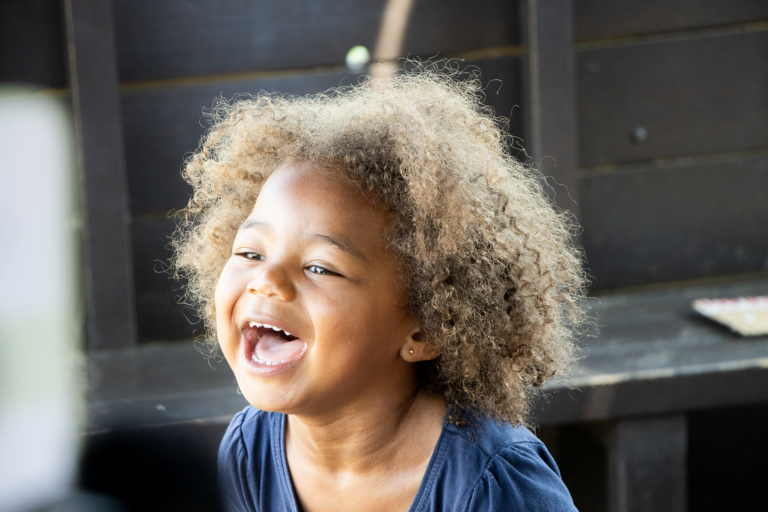
The Cornerstone Academy Trust implements the requirements of the Early Years Foundation Stage Statutory Framework. It sets out how the Academy takes a holistic approach to children’s well-being, education and health. The EYFS refers to children from birth to five years of age. At Cornerstone Academy Trust, this refers to children between the ages of 2 and 5.
At Cornerstone Academy trust we aim to:
- Deliver the standards for the learning, development and care of young children as set out in the Statutory Framework for the Early Years Foundation Stage
- Support the development of active and inquisitive learners encouraging children to be imaginative, creative, curious and critical thinkers.
- Ensure teaching nurtures, engages and motivates children
- Ensure the provision offers rich, varied and imaginative learning experiences
- Ensure that learning and development is planned around the needs and interests of the children and informed by the use of on-going assessment.
- Ensure that every child makes good progress and no child is left behind
- Create the framework for partnership by working with parents, professionals and other settings that the child attends
The Early year’s experiences we offer our children are based on the following four guiding principles:
- Unique Child
- Positive Relationships
- Enabling Environments with Teaching and Support from Adults
- Learning and Development
Prime Areas
- Personal, Social, and Emotional Development
- Communication and Language
- Physical Development
Specific Areas
- Literacy
- Mathematics
- Understanding the World
- Expressive Arts and Design
Our Nursery Teachers
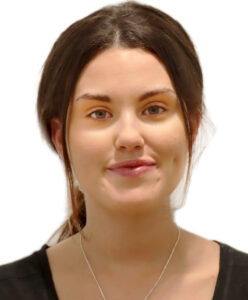
Broadclyst
Ellie Jones
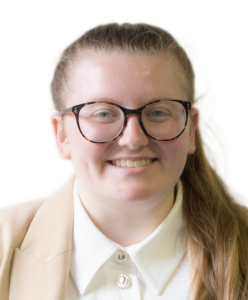
Monkerton
Clionee Nicholas
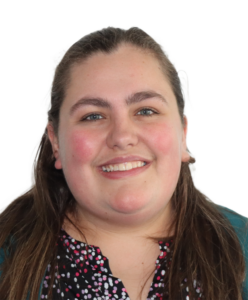
Monkerton
Victoria Real
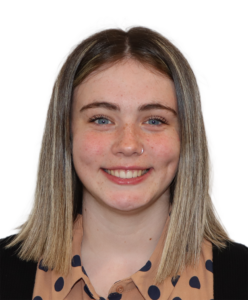
Westclyst
Chloe Garnett
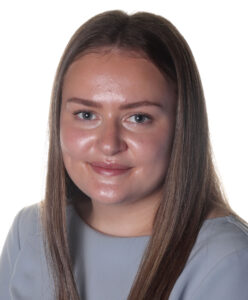
Westclyst
Sophie Lands
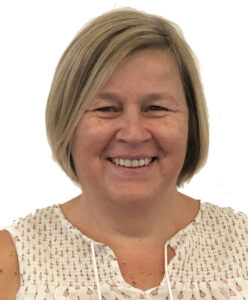
Yeo Valley
Paula Rudall
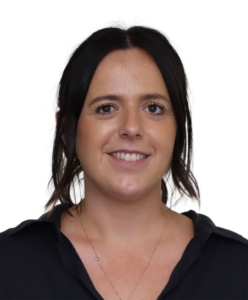
Marpool
Isha Johns
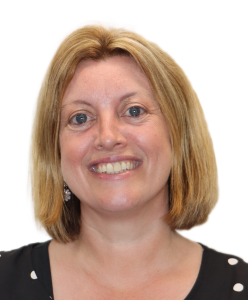
Clyst Heath
Elizabeth Gibson
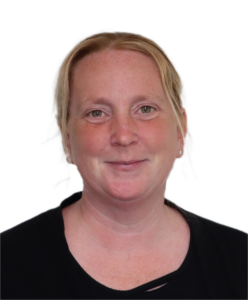
Marpool
Claire Partridge
